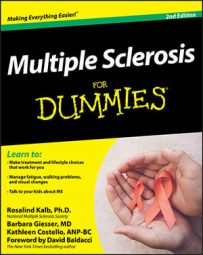Corticosteroids aren’t the answer for every person or for every MS relapse. Here are some other options for managing relapses:
H.P. Acthar Gel: For anyone who can’t obtain corticosteroids (shortages have occurred in the past), can’t tolerate the side effects, or whose veins don’t allow easy access for intravenous infusions, a medication called H.P. Acthar Gel is approved to treat relapses. This medication is made from adrenocorticotropic hormone or ACTH for short.
Like corticosteroids, ACTH treats the relapse but doesn’t affect the ultimate outcome or natural history of the MS. It’s administered by daily intramuscular injection over a two- to three-week period. The possible side effects include vomiting, changes in appetite, diarrhea, constipation, restlessness, difficulty sleeping, and sweating. Like corticosteroids, ACTH shouldn’t be used on an ongoing basis.
Plasma exchange: In 2011, the American Academy of Neurology issued new guidelines indicating that plasmapheresis (plasma exchange) may be useful to treat a particularly severe relapse that hasn’t responded to treatment with high-dose corticosteroids.
Plasmapheresis, which can be done at most major medical centers, typically involves seven treatments over a 14-day period and is very expensive. The treatment involves several steps:
Whole blood — which is part liquid (plasma) and part solid (red and white blood cells) — is withdrawn from the person’s body.
The plasma is separated from red and white blood cells and replaced by artificial plasma.
The new plasma is mixed with the person’s red and white blood cells, and together they are put back into the person’s body.
Plasmapheresis is helpful because it removes the plasma that contains factors that cause damage in MS. Because this process can put a person at risk for anemia and infections, it’s used only in the case of a very severe attack.
Intravenous immunoglobulin (IVIg): This medication, which is generally delivered by monthly intravenous infusion, is another option for people who can’t tolerate, can’t obtain, or don’t respond well to corticosteroids. However, MS specialists differ in their opinions about the effectiveness of IVIg.
In spite of whatever treatment your doctor prescribes for a relapse, some symptoms may remain. This is an ideal time to call on the expertise of the rehabilitation professionals.
If, for example, you’re left with weakness in your legs, balance problems, or more fatigue than you’ve been used to dealing with, a physical therapist can work with you to improve your walking and to identify the mobility aid that could best help you maintain your balance and conserve your energy.
The occupational therapist can recommend modifications to your home and work space to help you be more mobile and productive. If your relapse left you with some memory or attention problems, a neuropsychologist can help you scope out the problem and recommend some ways to compensate. So you can do a lot to get back in the groove.

